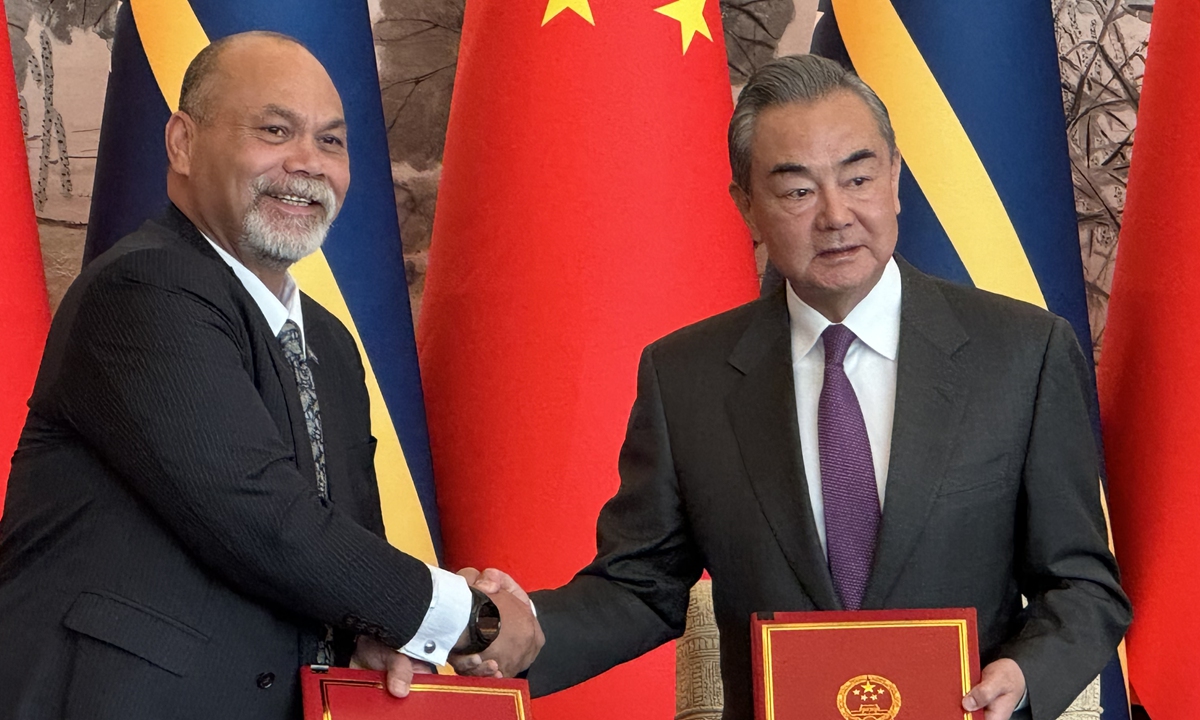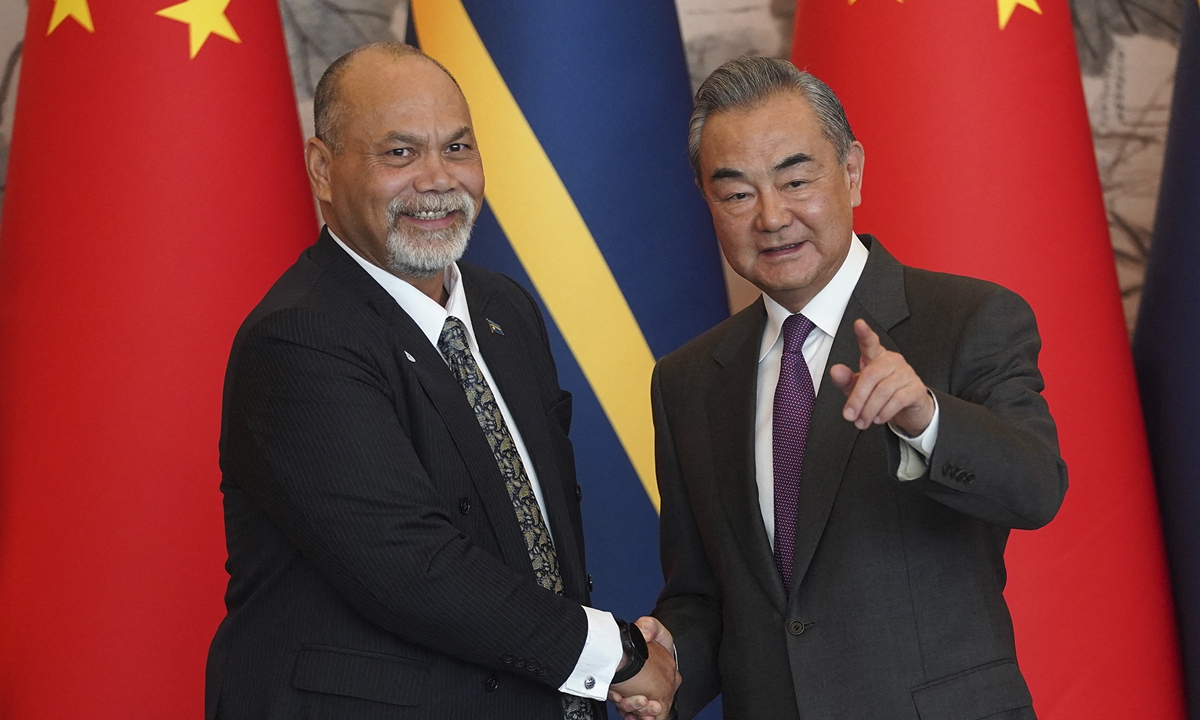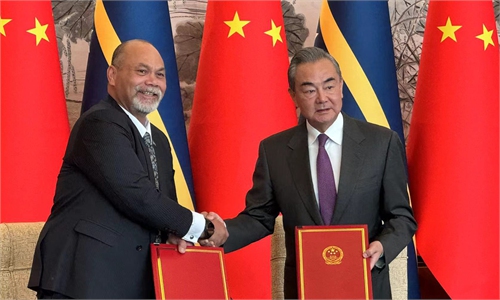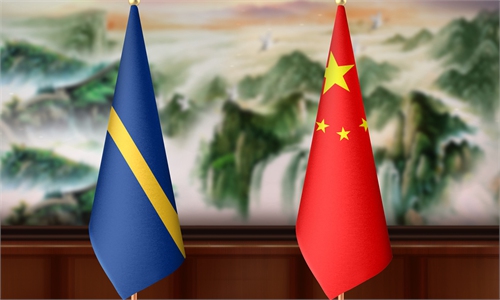China, Nauru officially resume diplomatic relations
Development unveils a new chapter of bilateral ties

Chinese Foreign Minister Wang Yi and Nauru's Minister for Foreign Affairs and Trade Lionel Aingimea shake hands after they signed a joint communiqué on Wednesday in Beijing on the resumption of bilateral diplomatic relations at the ambassadorial level. Photo: Chen Qingqing/GT

Chinese Foreign Minister Wang Yi (right) shakes hands with Nauru's Minister of Foreign Affairs and Trade Lionel Aingimea after they signed the Joint Communiqué on the Resumption of Diplomatic Relations between China and Nauru, at Diaoyutai State Guesthouse in Beijing on January 24, 2024. Photo: AFP
Ten days after Nauru announced it was severing "diplomatic relations" with China's Taiwan region, China and Nauru formally resumed diplomatic ties on Wednesday in Beijing, unveiling a new chapter for bilateral relations.It once again proves that the one-China principle is the widely accepted consensus and fundamental norm in international relations, representing the direction of people's will and the irresistible trend of the times, officials and experts said on Wednesday.
Chinese Foreign Minister Wang Yi, also a member of the Political Bureau of the Communist Party of China Central Committee, held talks with Nauru's Minister for Foreign Affairs and Trade Lionel Aingimea in Beijing on Wednesday. They signed a joint communiqué on the resumption of bilateral diplomatic relations at the ambassadorial level.
The Nauru cabinet made a political decision on January 16 to sever its ties with Taiwan region and resume diplomatic relations with China, a decision unanimously supported by the Nauru parliament. The independent and autonomous political decision the Nauru government made fully reflects the common will of the Nauru people, and China appreciates and welcomes this move, Wang said at the ceremony.
"Today marks a new chapter in the relationship between China and Nauru," Wang said, noting that Nauru has become the 183rd country to establish diplomatic relations with China.
As developing countries, both China and Nauru share the common tasks of developing the economy, improving people's livelihoods and achieving modernization, Wang noted. As members of the Global South, both sides share a common desire to defend their sovereign independence, uphold the common interests of developing countries, promote an equitable and orderly multipolar world, and foster inclusive and comprehensive economic globalization.
"These fundamental logics bring our two countries closer together and inevitably open up broad prospects for cooperation," the Chinese foreign minister said.
Aingimea noted at the ceremony that Nauru is impressed with China's economic growth, including its technological development that could benefit the world, and the Nauru is looking forward to deepening collaboration with China.
Some Chinese observers believe that the resumption of diplomatic relations between Nauru and China echoes a general and irresistible trend. While Nauru is standing on the right side of history, we will see more countries making the correct choice, and the so-called diplomatic allies of the island of Taiwan will soon dwindle to none, they said.
A new chapter
During a meeting between Wang and Aingimea on Wednesday, the senior Chinese diplomat pointed out that the Chinese and Nauru economies are highly complementary, with broad common interests and broad prospects for cooperation.
China is ready to take the resumption of friendship as an opportunity to strengthen exchanges at all levels, share governance experience and align development strategies, and jointly build good brothers, good friends and good partners with political mutual trust, economic mutual benefit and mutual support in international affairs, so as to build a closer community of shared future between China and Pacific Island Countries, Wang said.
The decision made by the Nauru government is a timely response to the international situation, given that China is the world's second-largest economy and has achieved great success in mutually beneficial cooperation with Pacific Island Countries, Chen Hong, director of the Australian Studies Center of East China Normal University, told the Global Times on Wednesday.
"For instance, the China-proposed Belt and Road Initiative [BRI] has improved the economic level and well-being of many countries in the region, and those tangible achievements are believed to be recognized by the Nauru government and people who come to know that China is a reliable and trustworthy partner," Chen said.
With a population of about 13,000, Nauru is facing an economic downturn, severe financial difficulties and significant unemployment. The country's economic development heavily relies on tourism, which in turn depends on robust infrastructure and an influx of foreign tourists.
"In this regard, Nauru needs to collaborate with China on developing infrastructure and attracting Chinese tourists," Yu Lei, chief research fellow at the Research Center for Pacific Island Countries of Liaocheng University, told the Global Times on Wednesday.
Meanwhile, the BRI has set a positive example in island nations by aiding countries like Papua New Guinea, Vanuatu and the Solomon Islands in infrastructure development, economic growth and employment enhancement, Yu noted.
"This success greatly appeals to Nauru, prompting the country's government to send delegates to the Solomon Islands to inspect Chinese-aided infrastructure projects like sports stadiums, significantly influencing their decision to restore diplomatic ties with China," he said.
Who is next?
While the world is closely watching this historic moment, some Western media have speculated who will be next to sever the so-called diplomatic relations with Taiwan island, especially when the DPP authorities' approach of using "dollar diplomacy" and pursuing "Taiwan independence" is destined to be abandoned by the international community.
Tuvalu expects to review its diplomatic ties with Taiwan after an election on Friday, Finance Minister Seve Paeniu was quoted as saying in a report by Reuters on Wednesday.
According to a report published on January 19 by the Weekend Australian, Tuvalu's representative to the island of Taiwan said a source told him that Tuvalu could cut "ties" with Taiwan after the Pacific nation's election on January 26.
Since Tsai Ing-wen took office as Taiwan regional leader in 2016, a total of 10 countries have severed "diplomatic relations" with the Taiwan region, leaving the number of countries that maintain the so-called relations with the island to 12, according to media reports.
Some experts in Taiwan also noted that after Solomon Islands severed "diplomatic ties" with Taiwan in 2019, a "domino effect" in the South Pacific became apparent. In recent years, China strengthened relations with Tuvalu, and compared to Palau and the Marshall Islands, Tuvalu has not been as distinctly pro-American.
Therefore, for the US and Australia, Tuvalu could potentially become the "next gap" in the Indo-Pacific security strategy, they noted.
The resumption of diplomatic relations between China and Nauru show that any so-called diplomatic relations with the Taiwan authorities as well as other relationships that should be established only with sovereign states are illegal, null and void, and are in need of correction - and will inevitably be corrected, Zheng Jian, deputy director of the research study committee of the China Council for the Promotion of Peaceful National Reunification and professor at the Taiwan research institute of Xiamen University, told the Global Times on Wednesday.
Certain countries undermine the one-China principle and incite other countries to develop ties with the Taiwan authorities for their own private interests. Such incitement ultimately leads to contradictions, unrest and conflicts, Zheng noted.
"International legal principles must not be violated, nor can international justice be compromised. As time goes by, more countries will see such individual nations more clearly and remain increasingly vigilant," he said.
"The fact that Nauru, a small country in terms of size and population, could withstand immense pressure from certain countries to restore diplomatic relations with China leaves no reason for the DPP authorities not to be apprehensive about when 'the next shoe will drop,'" Zheng said.





